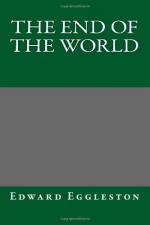It certainly is no disgrace to any literary man not to know anything of so remote a philosopher as Xenophanes. The first characteristic of a genuine literary man is the frankness with which he confesses his ignorance. But Humphreys did not really know but that Xenophanes was part of the daily reading of a man of letters.
“Oh! yes,” said he. “I have his works in turkey morocco.”
“What do you think of his opinion that God is a sphere?” asked the Philosopher, smiling.
“Oh! yes—ahem; let me see—which God is it that he speaks of, Jupiter or—well, you know he was a Greek.”
“But he only believed in one God,” said Andrew sternly.
“Oh! ah! I forgot that he was a Christian.”
So from blunder to blunder Andrew pushed him, Humphreys stumbling more and more in his blind attempts to right himself, and leaving, at last, with much internal confusion but with an unruffled smile. He dared not broach his errand by asking the address of August. For Andrew did not conceal his disgust, having resumed work at his loom, suffering the bowing impostor to find his own way out without so much as a courteous adieu.
CHAPTER XXII.
JONAS EXPRESSES HIS OPINION ON DUTCHMEN.
Sometimes the virus of a family is all drawn off in one vial. I think it is Emerson who makes this remark. We have all seen the vials.
Such an one was Norman Anderson. The curious law of hereditary descent had somehow worked him only evil. “Nater,” observed Jonas to Cynthy, when the latter had announced to him that Norman, on account of some disgrace at school, had returned home, “nater ha’n’t done him half jestice, I ’low. It went through Sam’el Anderson and Abig’il, and picked out the leetle weak pompous things in the illustrious father; and then hunted out all the spiteful and hateful things in the lovin’ and much-esteemed mother, and somehow stuck ’em together, to make as ornery a chap as ever bit a hoe-cake in two.”
“I’m afeard her brother’s scrape and comin’ home won’t make Jule none the peacefuller at the present time,” said Cynthy Ann.
“Wal,” returned Jonas, “I don’t think she keers much fer him. She couldn’t, you know. Love him? Now, Cynthy Ann, my dear”—here Cynthy Ann began to reproach herself for listening to anything so pleasant as these two last words—“Now, Cynthy Ann, my dear, you see you might maybe love a cuckle-burr and nuss it; but I don’t think you would be likely to. I never heern tell of nobody carryin’ jimson-weed pods in their bosoms. You see they a’n’t no place about Norman Anderson that love could take a holt of ‘thout gittin’ scratched.”
“But his mother loves him, I reckon,” said Cynthy Ann.
“Wal, yes; so she do. Loves her shadder in the lookin’-glass, maybe, and kinder loves Norman bekase he’s got so much of her devil into him. It’s like lovin’ like, I reckon. But I ’low they’s a right smart difference with Jule. Sence she was born, that Norman has took more delight in tormentin’ Jule than a yaller dog with a white tail does in worryin’ a brindle tom-cat up a peach-tree. And comin’ home at this junction he’ll gin her a all-fired lot of trials and tribulation.”




